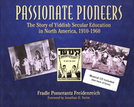Sort by: Author | Title | Publication Year
BOOKS
Passionate Pioneers: The Story of Yiddish Secular Education in North America, 1910-1960Fradle Pomerantz Freidenreich, with a foreword by Jonathan D. Sarna A little-known chapter in American Jewish history involves a wide network of Yiddish schools and camps—a vibrant, multifaceted educational movement—that sought to transmit a distinctive sense of secular yiddishkayt, or Jewishness. The first comprehensive record of this movement, Passionate Pioneers documents the myriad challenges, frustrations, and accomplishments of Yiddish secular More > |  |
Patrice Lumumbacompiled by Leo Zeilig This book is part of a unique series that presents the reader with the original writings and relevant source texts of liberation heroes of Africa, together with a coherent contextual framework and analysis of their legacy. More > |  |
Patronage or Partnership: Local Capacity Building in Humanitarian CrisesIan Smillie, editor Patronage or Partnership brings a new perspective to the subject of building local capacities in emergency and postemergency situations. Recognizing the real trade-offs that exist between aid workers acting quickly in the midst of an emergency, on the one hand, and working to build longer-term local skills, on the other—and critically examining this dilemma from local perspectives drawn from More > |  |
Peace and the Public Purse: Economic Policies for Postwar StatebuildingJames K. Boyce and Madalene O'Donnell, editors In the aftermath of violent conflict, how do the economic challenges of statebuilding intersect with the political challenges of peacebuilding? How can the international community help lay the fiscal foundations for a sustainable state and a durable peace? Peace and the Public Purse examines these questions, lifting the curtain that often has separated economic policy from peace More > |  |
Peace in Tatters: Israel, Palestine, and the Middle EastYoram Meital Peace in Tatters was born in a set of questions with which the author, an Israeli scholar, has struggled for some years: What went wrong in the Israeli-Palestinian peace process before the July 2000 Camp David summit and during the crucial negotiations? How have the dominant narratives about the collapse of the peace process been crafted? Does the ongoing crisis mark the end of the road for the More > |  |
Peace Operations Seen From Below: UN Missions and Local PeopleBéatrice Pouligny Béatrice Pouligny argues that much of what is being rebuilt in societies emerging from war —or in some cases what is continuing to be destroyed—often lies in the ordinary daily lives of both local populations and the staff of UN peacekeeping missions.
Pouligny's close analysis of UN interventions—in Cambodia, Somalia, Mozambique, El Salvador, Bosnia, Haiti, Sierra More > |  |
Peace through Health: How Health Professionals Can Work for a Less Violent WorldNeil Arya and Joanna Santa Barbara, editors The idea of working for peace through the health sector has sparked many innovative programs, described expertly and accessibly in Peace Through Health by professionals in the field. More > |  |
Peace, Justice, and Security Studies: A Curriculum Guide, 7th editionTimothy A. McElwee, B. Welling Hall, Joseph Liechty, and Julie Garber editors Fully revised to reflect the realities of the post–September 11 world, this acclaimed curricular reference provides a comprehensive review of the field of peace, justice, and security studies. Seven introductory essays systematically cover the state of the discipline today, surveying current intellectual and pedagogical themes. These are followed by seventy classroom-tested syllabuses More > |  |
Peacebuilding and Transitional Justice in East TimorJames DeShaw Rae Did the United Nations successfully help to build a just, peaceful state and society in postconflict East Timor? Has transitional justice satisfied local demands for accountability and/or reconciliation? What lessons can be learned from the UN’s efforts? Drawing on extensive field work, James DeShaw Rae offers a grassroots perspective on the relationship between peacebuilding and More > |  |
Peacebuilding as Politics: Cultivating Peace in Fragile SocietiesElizabeth M. Cousens and Chetan Kumar, editors, with Karin Wermester Although the idea of postconflict peacebuilding appeared to hold great promise after the end of the Cold War, within a very few years the opportunities for peacebuilding seemed to pale beside the obstacles to it. This volume examines the successes and failures of large-scale interventions to build peace in El Salvador, Cambodia, Haiti, Somalia, and Bosnia and Herzegovina.
The authors shed light More > |  |



